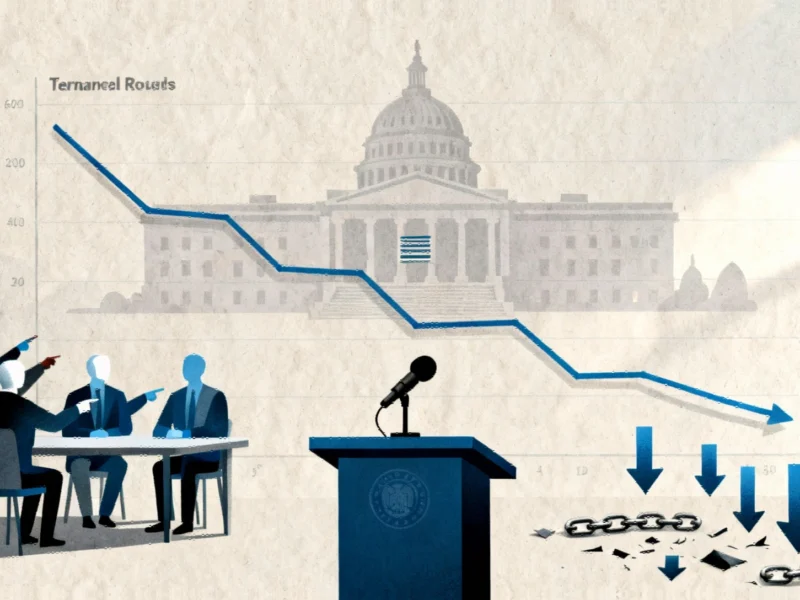TITLE: Financial Markets Navigate Data Void as Government Shutdown Enters Third Week
U.S. Treasury yields edged lower on Thursday as the federal government shutdown entered its 17th consecutive day, leaving investors navigating unprecedented data darkness about the nation’s economic health. With lawmakers repeatedly failing to reach a budget agreement, the prolonged stalemate has halted the release of all crucial economic indicators that typically guide market decisions and policy responses.
The yield decline, though modest at just a few basis points (where one basis point equals 0.01%), reflects growing investor unease about the economic landscape. As financial markets navigate uncertainty amid extended data gaps, market participants are increasingly relying on alternative sources for economic insights. This includes heightened attention to Federal Reserve officials’ speeches, with Fed Bank of St. Louis President Alberto Musalem scheduled to address markets later today.
Private Credit Market Concerns Intensify
Meanwhile, troubling signs are emerging in the private credit sector, adding another layer of complexity to the economic outlook. The recent bankruptcies of two auto-related industries earlier this year were followed by Wednesday’s disclosure from Zions Bancorporation of a $50 million loss on two commercial loans. The situation worsened on Thursday when Western Alliance revealed a borrower had committed fraud, raising questions about lending standards across the sector.
CNBC’s Jim Cramer captured market sentiment on Thursday, stating: “Today got real ugly, but at least we finally have something that can make the Federal Reserve itchy to cut interest rates sooner rather than later: bank loans gone bad. Nothing motivates the Fed to move faster than credit losses, because they’re a definitive sign that the economy is going south.”
Broader Economic Implications
The convergence of these factors—the government shutdown, missing economic data, and emerging credit concerns—creates a perfect storm of uncertainty for financial markets. Investors are essentially flying blind without the typical economic compass provided by government statistics on employment, inflation, and growth.
The data vacuum comes at a particularly sensitive time, as satellite images reveal how data centers are expanding rapidly to meet growing computational demands, highlighting the irony of the current information shortage facing policymakers and investors alike.
Regional and Sector-Specific Impacts
The economic strain extends beyond Wall Street, with tangible consequences appearing across various sectors and regions. Small and medium businesses are feeling particular pressure, as evidenced by situations where businesses face gut-wrenching decisions when forced to vacate premises due to economic pressures or regulatory actions.
Infrastructure challenges are also coming to the forefront, with rural connectivity crises prompting council interventions as remote work and digital dependence increase during the economic uncertainty.
Global Context and Strategic Implications
The situation has international ramifications, particularly in strategic industries. The United Kingdom’s experience shows how challenging these economic conditions can be for critical sectors, as Britain’s rare earth refinery ambitions face significant setbacks amid global supply chain pressures and financing challenges.
Even high-profile investment ventures aren’t immune to the current climate, with prominent dealmakers like Josh Wander facing scrutiny after high-profile bid failures in the sports and entertainment sectors.
As the shutdown continues with no clear resolution in sight, market participants remain focused on any signals from Federal Reserve officials and corporate earnings reports for clues about the underlying strength of the U.S. economy. The combination of missing government data and emerging credit market stress creates a challenging environment for both monetary policymakers and investors seeking to navigate the current economic landscape.
Based on reporting by {‘uri’: ‘cnbc.com’, ‘dataType’: ‘news’, ‘title’: ‘CNBC’, ‘description’: ‘CNBC International is the world leader for news on business, technology, China, trade, oil prices, the Middle East and markets.’, ‘location’: {‘type’: ‘place’, ‘geoNamesId’: ‘5101760’, ‘label’: {‘eng’: ‘New Jersey’}, ‘population’: 8751436, ‘lat’: 40.16706, ‘long’: -74.49987, ‘country’: {‘type’: ‘country’, ‘geoNamesId’: ‘6252001’, ‘label’: {‘eng’: ‘United States’}, ‘population’: 310232863, ‘lat’: 39.76, ‘long’: -98.5, ‘area’: 9629091, ‘continent’: ‘Noth America’}}, ‘locationValidated’: False, ‘ranking’: {‘importanceRank’: 14205, ‘alexaGlobalRank’: 270, ‘alexaCountryRank’: 92}}. This article aggregates information from publicly available sources. All trademarks and copyrights belong to their respective owners.



